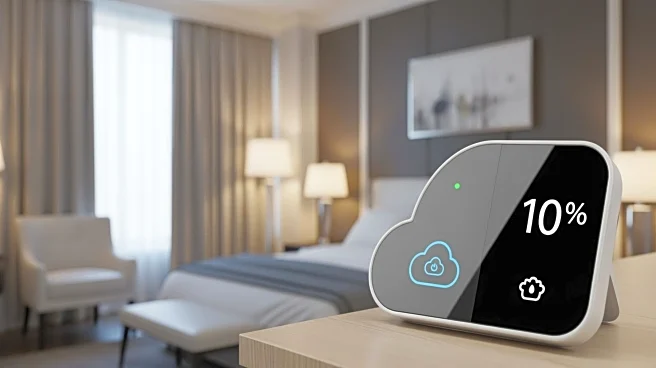What's Happening?
The hospitality industry is increasingly adopting cloud-based energy management solutions (EMS) to enhance efficiency and guest comfort. Traditional smart thermostats, which operate on 'If This, Then That'
logic, are being replaced by cloud-connected systems that leverage machine learning and artificial intelligence. This shift allows for more advanced and predictive features without the need for complex and costly in-room hardware. By moving intelligence to the cloud, hotels can optimize operations and energy savings, adapting to dynamic energy pricing and varying occupancy rates. This approach not only reduces costs but also enhances the guest experience by providing more responsive and adaptable climate control.
Why It's Important?
The transition to cloud-based EMS in the hospitality sector represents a significant technological advancement with broad implications. By utilizing cloud computing, hotels can reduce the cost of hardware while gaining access to powerful data analytics and predictive capabilities. This shift is crucial as it allows hotels to respond dynamically to energy pricing fluctuations, potentially leading to substantial cost savings. Moreover, the enhanced guest experience through improved climate control can increase customer satisfaction and loyalty. The move also reflects a broader trend in various industries towards cloud-based solutions, highlighting the growing importance of digital transformation in maintaining competitive advantage.
What's Next?
As the hospitality industry continues to embrace cloud-based EMS, further developments in AI and machine learning are expected to enhance these systems' capabilities. Hotels may increasingly rely on real-time data analytics to make informed decisions about energy use and guest comfort. Additionally, as more properties adopt these technologies, there may be a push for industry standards and best practices to ensure interoperability and security. Stakeholders, including hotel operators and technology providers, will likely collaborate to address challenges such as network reliability and data privacy, ensuring that the benefits of cloud-based EMS are fully realized.
Beyond the Headlines
The shift to cloud-based EMS in hospitality also raises important considerations around data privacy and cybersecurity. As these systems become more interconnected, ensuring the protection of guest data and maintaining robust cybersecurity measures will be critical. Furthermore, the reliance on cloud infrastructure underscores the need for reliable internet connectivity, which could pose challenges in regions with less developed digital infrastructure. The move also reflects a broader cultural shift towards sustainability, as more efficient energy management aligns with global efforts to reduce carbon footprints and promote environmental responsibility.










